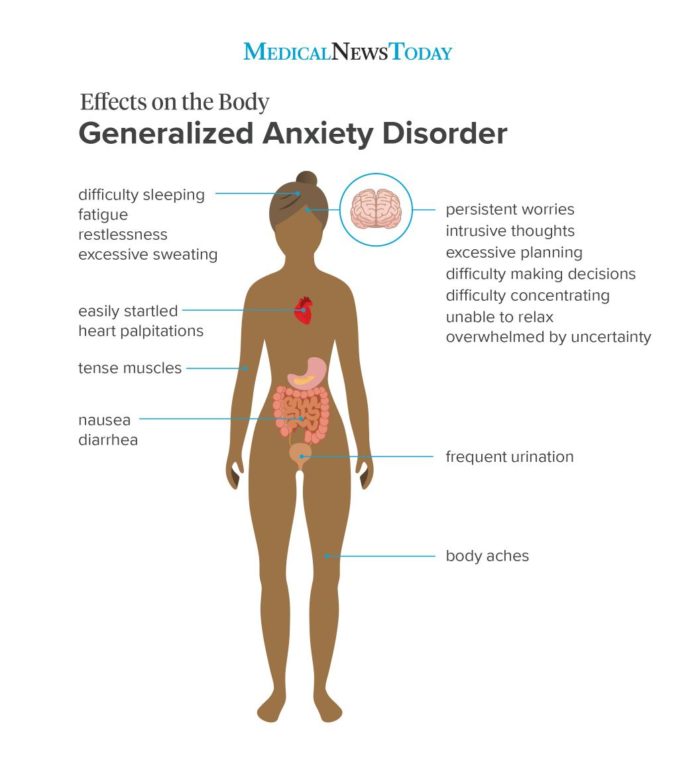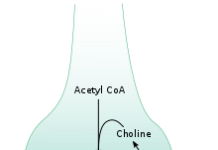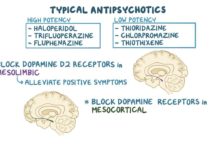Occasional worrying about health, money, relationships, and other things is natural and a normal part of life. But for people with generalized anxiety disorder (GAD), these worries become all-consuming.
People with GAD worry about everyday things even when there's no apparent cause for concern. In some cases, just thinking about getting through the day can trigger anxiety.
This excessive worry can cause certain physical symptoms and can interfere with daily life.
What Are the Symptoms of Generalized Anxiety Disorder?
Generalized anxiety disorder can cause numerous psychological symptoms, including:
- Excessive worry about everyday things
- Restlessness and inability to relax
- Difficulty concentrating
- Sleep issues, such as trouble falling asleep or staying asleep
- Irritability
- Feeling that everything will turn out badly
These issues may be accompanied by a number of physical symptoms, such as:
- Muscle tension and muscle aches
- Fatigue
The kinds of worries differed as well: older patients worried about their health and their family, while younger patients worried about their future and the health of others.
How Is Generalized Anxiety Disorder Diagnosed?
As with other anxiety disorders, there’s no specific test to diagnose generalized anxiety disorder.
Your doctor may conduct a physical examination and order blood tests to rule out other possible causes of your symptoms.
A diagnosis of generalized anxiety disorder is based on both your psychological and physical symptoms.
- Restlessness or edginess
- Becoming easily fatigued
- Difficulty concentrating, or feeling as if your mind has gone blank
- Irritability
- Muscle tension
- Sleep issues
Your symptoms must also be severe enough to impair your ability to go about your daily life, and must not be due to substance abuse or other disorders or health issues.
What Is the Treatment for Generalized Anxiety Disorder?
The two main treatments for GAD are psychotherapy and medications. Your doctor may prescribe a combination of treatments.
Therapists often use an approach called cognitive behavioral therapy, or CBT, to treat generalized anxiety disorder.
Your doctor might start you first on an antidepressant to help with your symptoms, and tell you that it may take four to six weeks to start feeling the effects, says Ken Duckworth, MD, the chief medical officer for NAMI and an assistant professor of psychiatry at Harvard Medical School in Boston.
Your doctor may also work with you to figure out whether to up your dosage or add a second medication; often, one medication can enhance the effects of the other or mitigate its side effects.
- Antidepressants such as Zoloft (sertraline), Prozac (fluoxentine), Cymbalta (duloxetine), Lexapro (escitalopram), or Paxil (paroxetine)
- Buspirone, an anti-anxiety drug
- Benzodiazepines such as Ativan (lorazepam), Valium (diazepam), or Xanax (alprazolam)
Antidepressants are a first-line treatment for GAD.
RELATED: Which Medications Are Best for Anxiety Disorders
RELATED: How Meditation Can Improve Your Mental Health
Additional reporting by Carlene Bauer.
Resources We Love
Editorial Sources and Fact-Checking
- Generalized Anxiety Disorder: Prevalence of Generalized Anxiety Disorder Among Adults. National Institute of Mental Health. November 2017.
- Generalized Anxiety Disorder: When Worry Gets Out of Control. National Institute of Mental Health. 2016.
- Generalized Anxiety Disorder: Symptoms and Causes. Mayo Clinic. October 13, 2017.
- Misri S, Abizadeh J, Sanders S, Swift E. Perinatal Generalized Anxiety Disorder: Assessment and Treatment. Journal of Women's Health. September 2015.
- Altunoz U, Kokurcan A, Kirici S, et al. Clinical Characteristics of Generalized Anxiety Disorder: Older vs. Young Adults. Nordic Journal of Psychiatry. February 2018.
- Locke A, Kirst N, Shultz CG. Diagnosis and Management of Generalized Anxiety Disorder and Panic Disorder in Adults. American Family Physician. May 2015.
- Psychotherapy. National Alliance on Mental Health.
- Mental Health Medications: Types of Medications. National Alliance on Mental Health.
- Benzodiazepine-Associated Risks. National Alliance on Mental Health. February 2019.
- Anxiety and Complementary Health Approaches: What the Science Says. NCCIH Clinical Digest for Health Professionals. August 2020.
- Exercise for Stress and Anxiety. Anxiety and Depression Association of America.
- Ratey J. Can Exercise Help Treat Anxiety? Harvard Health Publishing. October 24, 2019.













































